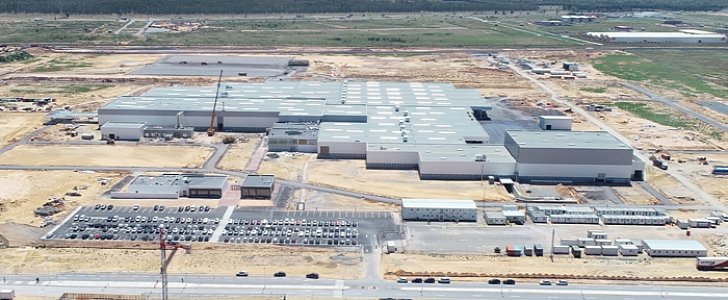Announced in June 2015, the Kenitra plant in Morocco is now operational. The all-new 208 is the first vehicle to go into production there, based on the CMP vehicle architecture that Peugeot also utilizes in the 2008 crossover.
From mid-2020, Groupe PSA promises to increase production capacity to 200,000 vehicles. Kenitra will serve customers in 80 markets, and the 208 is also manufactured in Trnava, Slovakia.
“The performance of the Kenitra plant should enable it to produce models,” said the French group, meaning that the 208 will be joined by other Common Modular Platform nameplates such as the 2008, Opel Corsa, and DS 3 Crossback. For the time being, the DS is manufactured in Poissy, France while the Corsa is made in Zaragoza, Spain.
In regard to the e-208, e-2008, and Corsa-e, and DS 3 Crossback E-Tense, the biggest challenge in Europe is battery supply. Factories in Europe such as Deutsche Accumotive don’t make the cells, which are supplied by Asian companies. The biggest players in this industry are Samsung SDI, Panasonic, CATL, and LG Chem. According to UK managing director David Peel, 40 percent of the cost is allocated to the batteries.
The four models mentioned in the previous paragraph utilize a 50-kWh battery, matching the capacity of the 2019 Renault Zoe. At least in Europe, the Nissan Leaf is the best-selling electric vehicle while the Renault Zoe came in on second in 2018 Zoe. In a distant third place, the Volkswagen e-Golf is on its last legs considering the ID.3 electric hatchback is right around the corner.
Turning our attention back to Kenitra, “Morocco is a historic and strategic market for our Group and its four brands” according to member of the board Jean-Christophe Quémard. “We are forging a unique partnership in Morocco’s automotive industry, thanks to the help of all our partners and the support of the Moroccan authorities.”
By mid-2020, Groupe PSA expects to employ 4,500 workers at the Kenitra plant. All told, make that 20,000 direct and indirect jobs. French rival Renault also operates two facilities in Morocco, namely the production plants in Tangiers and Casablanca.
“The performance of the Kenitra plant should enable it to produce models,” said the French group, meaning that the 208 will be joined by other Common Modular Platform nameplates such as the 2008, Opel Corsa, and DS 3 Crossback. For the time being, the DS is manufactured in Poissy, France while the Corsa is made in Zaragoza, Spain.
In regard to the e-208, e-2008, and Corsa-e, and DS 3 Crossback E-Tense, the biggest challenge in Europe is battery supply. Factories in Europe such as Deutsche Accumotive don’t make the cells, which are supplied by Asian companies. The biggest players in this industry are Samsung SDI, Panasonic, CATL, and LG Chem. According to UK managing director David Peel, 40 percent of the cost is allocated to the batteries.
The four models mentioned in the previous paragraph utilize a 50-kWh battery, matching the capacity of the 2019 Renault Zoe. At least in Europe, the Nissan Leaf is the best-selling electric vehicle while the Renault Zoe came in on second in 2018 Zoe. In a distant third place, the Volkswagen e-Golf is on its last legs considering the ID.3 electric hatchback is right around the corner.
Turning our attention back to Kenitra, “Morocco is a historic and strategic market for our Group and its four brands” according to member of the board Jean-Christophe Quémard. “We are forging a unique partnership in Morocco’s automotive industry, thanks to the help of all our partners and the support of the Moroccan authorities.”
By mid-2020, Groupe PSA expects to employ 4,500 workers at the Kenitra plant. All told, make that 20,000 direct and indirect jobs. French rival Renault also operates two facilities in Morocco, namely the production plants in Tangiers and Casablanca.

































































